Search Results
Showing results 101 to 120 of 293
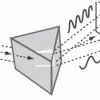
Rainbow in the Room
Source Institutions
This activity generates learner excitement about light through the creation of a room-sized rainbow.
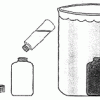
Make Your Own Deep-Sea Vent
Source Institutions
In this activity, learners make a model of the hot water of a deep sea vent in the cold water of the ocean to learn about one of the ocean's most amazing and bizarre underwater habitats.
Let's Go Ice Fishing
Source Institutions
In this activity, learners are challenged to lift a floating ice cube out of a glass of water using just one end of a piece of string.
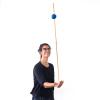
Balancing Stick
Source Institutions
In this quick and simple activity, learners explore how the distribution of the mass of an object determines the position of its center of gravity, its angular momentum, and your ability to balance it
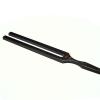
Doppler Effect
Source Institutions
In this activity, learners use a tuning fork to explore how the Doppler effect works.
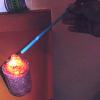
Hot Stuff!: Creating and Testing for Carbon Dioxide
In this demonstration, learners observe vinegar and baking soda reacting to form carbon dioxide (CO2) gas.
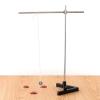
Strange Attractor: Observe Chaotic Motion
Source Institutions
In this activity, learners can observe chaotic motion. A magnet tied to a piece of string makes a pendulum, which swings over three sets of fixed magnets.
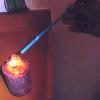
Hot Stuff!: Testing Ice
In this demonstration, learners compare and contrast regular water ice to dry ice (frozen carbon dioxide). Both samples are placed in a solution of acid-base indicator.
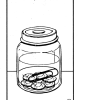
Reaction: Yes or No?
Source Institutions
In this activity, learners mix ingredients in a plastic bag, and then identify three characteristics of a chemical reaction: production of heat, color change, and production of a gas.
Test Your Lung Power
Source Institutions
In this activity, learners try to blow up a balloon hanging inside of an empty bottle.
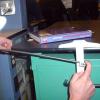
Bend That Bar
Learners play the role of materials engineers as they test the flexibility of different materials.

Inertia
Source Institutions
In this physics activity (page 8 of the PDF), learners will explore the concept of inertia by attempting to run and stop quickly.
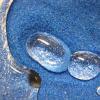
Magic Sand: Nanosurfaces
Source Institutions
This is an activity/demo in which learners are exposed to the difference bewteen hydrophobic surfaces (water repelling) and hydrophilic surfaces (water loving).

Rocket Science
Source Institutions
Learners create a small explosion by collecting hydrogen and oxygen gas together and squeezing them into a flame.
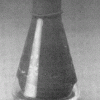
Balloon in a Flask
Source Institutions
Learners observe a flask with a balloon attached over the mouth and inverted inside the flask.
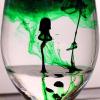
Floating and Falling Flows
Learners create beautiful fluid motion. They explore fluid dynamics, surface tension, solubility, and buoyancy while mixing liquids together.
Triboluminescence
Source Institutions
In this activity, learners discover what happens when they crush wintergreen-flavored candies in a very dark room.

Starch Breakdown
Source Institutions
Learners use Benedict’s solution and heat to test for the presence of simple sugars in glucose, sucrose, starch, and starch combined with amylase.
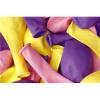
Balloon Inside a Bottle
Source Institutions
In this activity about phase change and condensation, learners boil water in an empty pop bottle in the microwave.
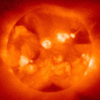
Four of the States of Matter
Source Institutions
This kinesthetic science demonstration introduces learners to four states of matter: solid, liquid, gas, and plasma.
